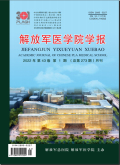解放军医学院学报2024,Vol.45Issue(3):213-222,238,11.DOI:10.12435/j.issn.2095-5227.2023.118
慢性心衰患者的远程疾病管理计划有效性评价:一项非劣效性随机对照试验
Effectiveness of telemonitoring-based disease management program in patients with chronic heart failure:A non-inferiority randomized controlled trial
摘要
Abstract
Background Outpatient review of patients with heart failure(HF)is impeded in contexts of the COVID-19 pandemic,and the effectiveness of using telemonitoring devices for disease management in patients with HF is inconclusive.Objective To investigate whether a telemonitoring-based disease management program is noninferior to traditional outpatient review.Methods Adopting a non-inferiority design,this study recruited patients with HF at the First Medical Center of Chinese PLA General Hospital from March 2021 to March 2023 and randomly assigned them to the telemonitoring management group(TMG)and outpatient review group(ORG).The trial intervention lasted for six months,with follow-up visits in the third and sixth months to collect patients'data.The ORG received the routine outpatient review intervention.The TMG received telemonitoring management while reducing the frequency of outpatient reviews.The primary outcome in this study was the percentage of days lost due to unplanned cardiovascular hospital admissions or all-cause death.Secondary outcomes were patients'NT-proBNP,quality of life,and patient adherence.Results Totally 113 patients were recruited(57 in the TMG and 56 in the ORG),with 97 cases had completed the six-month follow-up.The percentage of days lost due to unplanned cardiovascular hospital admission or all-cause death was significantly different between subjects in the TMG and ORG review groups at 3-and 6-month post-intervention in the non-inferiority test(P<0.05 for non-inferiority test).MLHFQ scores decreased from the baseline period in both test groups,and a comparison between the two groups found that scores in the TMG were significantly lower than those in the ORG(P<0.05).The mean NT-proBNP level decreased significantly in both groups compared to the baseline period(P<0.05),and the decrease in the TMG was significantly higher than that in the ORG(P=0.022).In the TMG,the utilization rate of the telemonitoring system was 76.92%.In the ORG,48(85.71%)subjects completed the outpatient review as required.Conclusion The telemonitoring-based disease management program implemented for heart failure patients in this study is noninferior to traditional outpatient review in reducing the percentage of days lost due to unplanned cardiovascular hospital admission or all-cause death,which significantly reduces NT-proBNP as well as improves quality of life levels in HF patients.关键词
心力衰竭/疾病管理/远程监护/随机对照试验/非劣效性Key words
heart failure/disease management/telemonitoring/randomized controlled trial/noninferiority分类
医药卫生引用本文复制引用
段永杰,何昆仑,钟琴,饶宠佑,李宗任,付立强,汪驰,朱頔,王瑞青,董蔚..慢性心衰患者的远程疾病管理计划有效性评价:一项非劣效性随机对照试验[J].解放军医学院学报,2024,45(3):213-222,238,11.基金项目
北京市自然科学基金项目(L22006) (L22006)
军队课题(2022SYSZZKY11) (2022SYSZZKY11)

